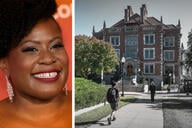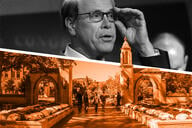You have /5 articles left.
Sign up for a free account or log in.
Love it or hate it, social media is no passing fad -- and increasingly it’s intertwined with more traditional academic platforms. Numerous scholars have popular blogs, for example, on which they test out new ideas and share research. Other academics have made names for themselves on Twitter or Facebook -- both to the benefit and detriment of their respective careers.
While few institutions have yet formally incorporated social media into their tenure and promotion standards, it’s undeniable that such activity is already informing personnel decisions -- again, for better or for worse. Seeking to get ahead of the curve in a field with many public communicators, as well as some social media controversies, a subcommittee of the American Sociological Association looked at social media and other public communications with regard to tenure and promotion.
The committee’s report, called “What Counts? Evaluating Public Communication in Tenure and Promotion,” doesn't recommend that professors’ online profiles eclipse their traditional tenure dossiers. But it does suggest that departments either consider adding a public communication criterion for tenure and promotion beyond teaching, research and service, or “recognize and reward” public engagement within the three traditional categories. It also seeks to “fill the vacuum” in standards for assessing the work of public communication.
“Departments traditionally consider tenure cases on the basis of three categories: research, teaching and service. Yet public engagement comes in many cross-cutting forms, including conventional types of public communication, digital scholarship and social media outreach, as scholars communicate about their research or teaching with a broader audience,” the report says. “Sociologists engaging in public communication may struggle to appropriately highlight these types of contributions -- which in some cases have substantial importance in their field -- within the standard three categories for tenure. Departments may set their own priorities within these traditional parameters.”
The report offers several main assessment criteria, including type of content. Is the communication original research, synthesis, explanatory journalism, opinion or application of research to practical issues? Regardless of medium, however, a given piece should be “well grounded in sociological theory and research.”
Rigor and quality of communication matter, too, according to the report. Is the piece clearly written, foregrounding policy implications and compliant with the given format? Does it engage the audience?
Beyond mastery of the medium, public impact is also a factor -- including number of readers and evidence that practitioners found it helpful. “No single measure of reach or impact is sufficient, but solicitation of letters from affected parties outside of academia can be especially effective in conveying impact,” the report says.
It’s important to note that the report doesn’t focus exclusively on social media or blogging. It defines public communication in general as “cross-cutting the traditional categories of research, teaching and service.” Sociologists could present research findings in op-eds for newspapers, or comment on the news, which many have done since long before the age of Twitter, for example. Yet the report pays particular attention to social media, saying sociologists may use it to share research findings, in particular, but also in teaching and service.
Several scholarly associations have signaled the growing importance of an online profile, or proposed standards for evaluating digital research. But the sociological association says it’s the first to focus on evaluation criteria for public communication.
The American Association of University Professors doesn’t have a stance on whether public communication should be part of tenure and promotion decisions, other than that tenure and promotion criteria are the primary responsibility of the faculty.
A few institutions already have standards for assessing public communications in personnel decisions. Hans-Joerg Tiede, associate secretary for academic freedom, tenure and governance at AAUP, said he wasn’t aware of any trend in that direction, but that some institutions do encourage faculty members to have a “presence” on social media.
Pros and Cons
The sociological association’s report outlines benefits of public communication, including that it advances scholarly knowledge and methods through new forums of communication and exchange and expands the visibility and relevance of the discipline with the public. It also provides a “justification for public funding by states and federal granting agencies” and “democratizes” notions of scholarly expertise.
For individual faculty members, social media use may help in developing a network, sharing information with a wider audience in a timely manner, generating new ideas and getting feedback, increasing citation counts of published work, bypassing traditional publication gatekeepers, and creating fresh materials for teaching, the report says.
In their own discussions about evaluating public communication, departments should consider standards that promote gender and economic equity, as well as “valuable stewardship,” according to the report. “Public engagement can lead to amplification of work, but only the highest-quality work should be promoted,” it says, noting that sociology at large will have to “vet work and make sure to clarify when work reported beyond the academy is based on flawed methods, or when work may have a certain agenda by disclosing potential conflicts of interest.”
One major, potential drawback of public communication as a tenure criterion is “adding another demand on our time, particularly if it distracts from our conventional responsibilities to conduct research, teach and serve our profession,” the report says. “As we all know, valuable time can be squandered online, and as noted above, negative and unproductive lines of communication can develop (e.g., regarding the job market or teacher evaluations).”
For those reasons, caution needs to be exercised in “advocating for an increase in the public engagement of faculty members; only that which clearly supports and enhances research, teaching, service, professional development and stewardship to the public should be embraced.”
Beyond wasting time, sociologists and others scholars can get into hot water for their online comments. Saida Grundy, an assistant professor of sociology at Boston University, for example, was in 2015 rebuked for her Twitter comments about race. While many sociologists came to her defense, saying her comments were backed up by research, her case demonstrates that social media is a potential minefield in a tenure bid.
Philip Cohen, a professor of sociology at the University of Maryland at College Park, hasn’t avoided controversy with his longtime blog, Family Inequality. He used it as a platform to criticize a now-largely discredited study on adoptions by gay parents, for example.
Cohen said he wasn’t at all opposed to the new American Sociological Report, with a few caveats. First, he said, “We don't need credit toward promotion for every thing we do.” Scholars who take a “public-facing stance” often find that it enhances the quality and quantity of their work in terms of teaching, scholarship and service, he said, so separately rewarding it isn't always necessary. Cohen said his own blog has led to research and teaching ideas, better feedback on his research, quality graduate students, invitations to contribute to policy, and book contracts, for example.
To the Grundy point, Cohen said, “We’d all love to be promoted for authoring a great tweet, but no one wants to be fired for a bad one.” So assessment of public engagement “needs to be holistic and qualitative, taking into account the quality, quantity and impact of the work.”
“Simplistic, quantitative metrics will not be useful,” he added.
Echoing the subcommittee’s suggestion that departments may incorporate public communication into the existing criteria of teaching, research and service, Cohen said it’s important to “value and reward openness in our routine work.” That includes posting working papers, publishing in open-access journals, sharing replication files and disseminating open teaching materials. Public engagement “does not need to mean separate activities and products, but can mean taking a public-facing stance in our existing work,” he said.
The association’s report lists a few universities that already have begun incorporating public communications into personnel decisions. Virginia Tech’s tenure dossier template for “International and Professional Service and Additional Outreach and Extension Activities,” for example, includes a subsection suggesting candidates list such items as “outreach and extension publications, including trade journals, newsletters, websites, journals, multimedia items, etc.”
The document “does not delineate specific items beyond websites, though the umbrella term ‘multimedia items’ seems to invite other types of digital public engagement,” reads the sociological association’s report.
Sarah Ovink, an assistant professor of sociology at Virginia Tech, served on the association’s public communication subcommittee and helped co-author the report. Asked whether social media is a part of her own tenure portfolio, Ovink said it depends how that's defined. She’s included her posts to the popular Gender & Society blog, for example, but not her Twitter and Facebook comments.
“Different sociologists may also interpret how social media use figures into a tenure portfolio quite differently, depending on how they use it,” Ovink said. A sociologist who, for example, uses Twitter "extensively as part of their teaching effort -- say, creating a feed tied to a particular class, as some do -- may indeed highlight this usage as part of a tenure portfolio."
Leslie McCall, a professor of sociology at Northwestern University, chaired the subcommittee -- admittedly with little previous thought to the role of social media in personnel decisions. She said a major takeaway of the report is that external letters of evaluation -- so important in terms of assessing traditional research criteria -- could be solicited "explicitly with the intent of evaluating a candidate's public communication and social media activities." That's if those activities are an important part of the candidate's professional work and if the candidate requests it.
Another big finding is that “every academic should become educated about the social media terrain -- its advantages and disadvantages, though we think on balance the former outweigh the latter,” McCall said, “and make an informed decision about whether and how to participate in it, and in the broader process of public communication.”





